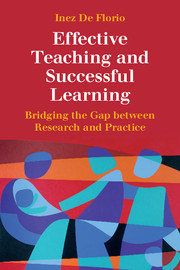Book contents
- Frontmatter
- Epigraph
- Contents
- Preface
- Introduction
- 1 Main Features of Scientific Research on Education
- 2 Important Types of Scientific Research on Education
- 3 Main Features of Evidence-based Research on Education
- 4 Meta-Analyses on Education
- 5 A Synthesis of Over 800 Meta-Analyses Relating to Achievement
- 6 Scaffolding Effective Teaching and Successful Learning
- 7 Planning and Starting the Lesson
- 8 Presenting Knowledge and Skills – Assertive Questioning
- 9 Guided and Independent Practice
- 10 Cooperative and Project-based Learning
- 11 Feedback – Reciprocal and Informative
- Concluding Remarks: Standards Need More Evidence
- References
- Index
4 - Meta-Analyses on Education
Published online by Cambridge University Press: 05 June 2016
- Frontmatter
- Epigraph
- Contents
- Preface
- Introduction
- 1 Main Features of Scientific Research on Education
- 2 Important Types of Scientific Research on Education
- 3 Main Features of Evidence-based Research on Education
- 4 Meta-Analyses on Education
- 5 A Synthesis of Over 800 Meta-Analyses Relating to Achievement
- 6 Scaffolding Effective Teaching and Successful Learning
- 7 Planning and Starting the Lesson
- 8 Presenting Knowledge and Skills – Assertive Questioning
- 9 Guided and Independent Practice
- 10 Cooperative and Project-based Learning
- 11 Feedback – Reciprocal and Informative
- Concluding Remarks: Standards Need More Evidence
- References
- Index
Summary
Before analyzing some well-known examples of meta-analytic research on education, we should have a closer look at definitions and implications of this overestimated research design. The results of meta-analyses and their aggregation to mega-analyses could be of value for educational practitioners if the research was carried out according to the standards of quality, which means based on experiments or at least quasi-experimental studies. Quite often, however, meta-analyses include primary studies of lower quality. Therefore it is very difficult for teachers to evaluate the findings of meta-analytic studies. In many cases, educators have to use their expertise to decide if the findings of a meta-analysis may have a positive impact on their students. To be able to do so requires basic knowledge of syntheses of research.
META-ANALYSES AND EFFECT SIZES
If not taken as unquestionable truth, the results of meta-analyses are valuable sources on the path to an improvement of one's educational practices. What is a meta-analysis and in what way can it contribute to render our teaching more effective and the learning of our students more successful?
If evidence-based education is considered as a means to attain better results, why should educational practitioners limit their work to a single study or one Randomized Controlled Trials (RCT)? Wouldn't it be better to consult as many studies on the same subject as possible? Why not take all available research into account?
Long before the elaboration of meta-analyses, systematic reviews of research, that is to say summaries of all existing research regarding an intervention program or a single teaching and learning strategy, were compiled. How does a scholar proceed when engaged in developing a systematic research review? Even though not all reviewers elaborate systematic reviews in the same way, the steps are mainly as follows: The first step consists of trying to find all studies on a subject consulting bibliographies and other means of literature research. Like all the following steps, the literature research places high requirements on the diligence of the reviewer. Having possibly found all studies on a subject, the reviewing scholars have to consult and to group them scrupulously, and to establish criteria for their presentation. A systematic research review thus tries to summarize all available studies on a subject, describing the findings in a narrative form.
- Type
- Chapter
- Information
- Effective Teaching and Successful LearningBridging the Gap between Research and Practice, pp. 63 - 78Publisher: Cambridge University PressPrint publication year: 2016



